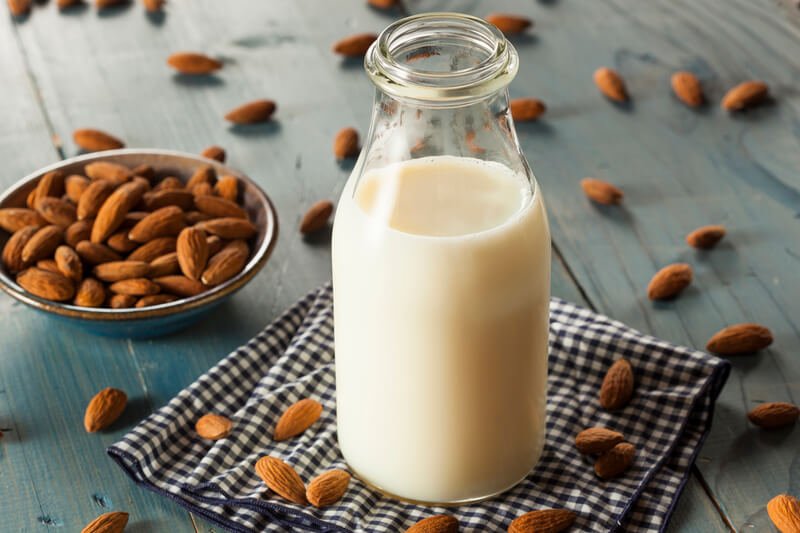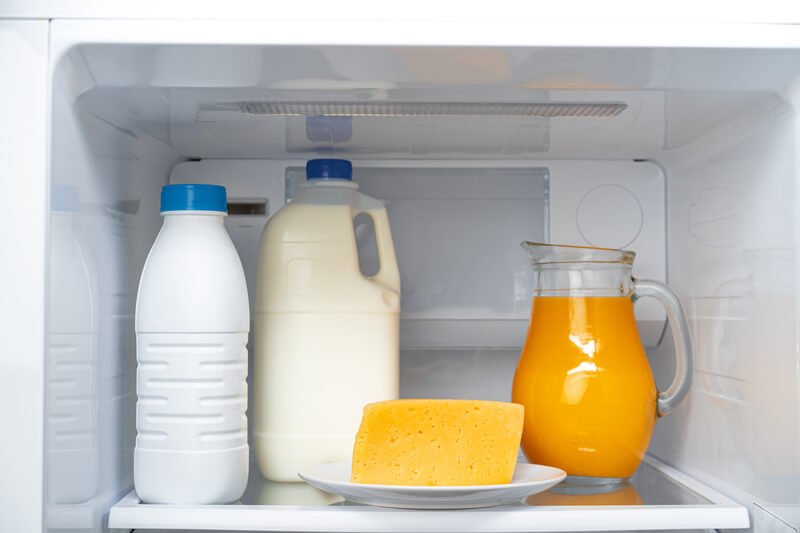When switching to a plant-based beverage like almond milk, you may wonder if it goes bad like dairy milk.
Bad milk is notorious for its rancid smell, lumpy texture, and sour taste.
This transformation is due to an overgrowth of bacteria that interacts with the sugars in dairy milk to create lactic acid.
If left alone long enough, lactic acid makes casein, which curdles the milk, giving it the tell-tale spoilage signs.
Almond milk, on the other hand, doesn’t contain the same sugars and acids as dairy milk.
Although almond milk can go bad, but many factors determine how long your almond milk will stay fresh and how to tell if it has spoiled.
Learn more about the lifespan of different types of almond milk, how to tell if it’s gone bad, and how you can make your almond milk last longer.
Types of Almond Milk
Before exploring the ins and outs of almond milk spoilage, it’s beneficial to understand how different types of almond milk are made and how this affects their longevity in your cabinet or fridge.
There are typically three types of almond milk you’ll come across if you drink this plant-based beverage:
- Homemade
- Store-bought shelf-stable
- Store-bought refrigerated almond milk
Homemade Almond Milk
Homemade almond milk is made from a few simple ingredients. The most basic recipe uses whole, raw almonds, and filtered water.
Typically, you soak the almonds overnight in water, blend them with water, and then strain the pulp for a smooth consistency.
Some people add a touch of honey, sugar, or maple syrup for sweetness and a dash of vanilla for flavor.
Homemade almond milk doesn’t contain any preservatives and should be stored in your fridge in an air-tight container.

Store-Bought Refrigerated Almond Milk
Store-bought refrigerated almond milk is made much like homemade almond milk.
It begins with almonds and filtered water; however, most almond milk manufacturers add extra ingredients to help their product remain fresher longer.
One popular brand of store-bought refrigerated almond milk contains
- Almonds
- Filtered water
- Calcium carbonate
- Sea salt
- Potassium citrate
- Sunflower lecithin
- Gellan gum
- Natural flavors
- Vitamin A palmitate
- Vitamin D2
- Vitamin E
In addition to added ingredients, refrigerated almond milk is typically pasteurized to give it a longer refrigeration life.
Most companies use an ultra-pasteurization process called High Temperature, Short Time (HTST) to destroy potentially harmful pathogens.
It is also packaged inside a specially designed and sealed package that keeps it free from bacteria until opened.

Shelf-Stable Almond Milk
Store-bought shelf-stable almond milk is made similarly to homemade or refrigerated almond milk.
Shelf-stable almond milk comes in different packaging and does not require refrigeration until after its opening.
A popular shelf-stable almond milk option contains many of the same ingredients as the refrigerated product, but the pasteurization and packing process differ.
Shelf-stable almond milk goes through what’s called an aseptic packaging process.
Aseptic refers to a closed process that uses extremely high temperatures to sterilize the product and its container during packaging.
The FDA requires shelf-stable beverages to be hermetically sealed to prevent bacterial growth, giving the product long shelf life.

Does Almond Milk Go Bad?
The short answer is yes, almond milk does go bad. Like any food product, almond milk is susceptible to bacterial growth and mold under the right conditions.
Homemade almond milk is the quickest to spoil.
This is because most people making homemade almond milk aren’t doing so under sterile conditions.
Unless you use gloves and sterilize your storage bottle and blender, you expose your homemade almond milk to bacteria from day one.
Store-bought refrigerated and shelf-stable options last longer than homemade almond milk because they aren’t exposed to germs during manufacture.
Additionally, these products contain stabilizers and preservatives that help them ward off bacteria for an extended amount of time.
Related: How Long Can Almond Milk Sit Out?
How Long Does Almond Milk Last?
The exact timeframe for almond milk spoilage depends on the type of almond milk and how you store it.
For example, if you let homemade or refrigerated almond milk sit out for more than an hour or two and reach a temperature higher than 40° F, it will spoil much more quickly than if you store it properly.
The generally accepted timeframes for how long almond milk will last are as follow:
Type | Shelf Life (After Opening) |
|---|---|
Homemade Almond Milk | 5-7 Days |
Refrigerated Almond Milk | 7-10 Days |
Shelf-Stable Almond Milk | 7-10 Days |
- Homemade almond milk kept in an airtight container in the refrigerator - around 5 to 7 days
- Store-bought refrigerated almond milk kept in the fridge - about 7 to 10 days after opening
- Store-bought shelf-stable almond milk - around 3 to 4 weeks after the use-by date if unopened, and 7 to 10 days in the refrigerator after opening
The U.S. Department of Agriculture doesn’t require manufacturers to label their food with an expiration date.
Despite this, most manufacturers still label their products, but they may use different labels, such as the following:
- “Best Used By/Before” - does not indicate spoilage, but rather when the product quality is best
- “Sell-by” - meant for the seller and does not indicate safety
- “Use-by” - recommended use-by date for best quality, doesn’t indicate spoilage
- “Expiration date” - the predetermined date when the product is likely expired or no good
You’ll want to check the label on your almond milk for specific manufacturer recommendations.
All almond milk brands use different preparation and packaging techniques, so it’s best to go by the recommendations on their packages.
For example, Elmhurst 1925 almond milk recommends refrigerating their product and using it within 7 to 10 days after opening.
Three Trees almond milk states that their almond milk is good for 10 days if stored in the refrigerator after opening and may last longer if kept in a very cool spot.
Better Than Milk almond drink is shelf-stable, but the company recommends drinking it within 5 to 7 days once opened.
How To Tell If Almond Milk Has Spoiled
If you’re worried that your almond milk has gone bad, there are a few ways to confirm your suspicions.
Try the following to gauge whether or not your almond milk has gone “off” and if you can still use it or are better off chucking it out.
1. Smell It
One of the first signs of spoiled almond milk is the smell.
Open your container and give it a sniff. If it smells like dirty feet or sweat, it’s gone bad, and you should throw it away.
2. Check the Consistency
Pour a small amount of the beverage into a glass.
If you notice sliminess or your almond milk is lumpy or chunky, it is likely spoiled and should be discarded.
3. Examine the Packaging
As almond milk spoils, it changes the texture and releases gas. This can cause the packaging to expand or swell.
If you notice the container is misshapen, bloated, or leaking, throw the almond milk in the trash.
4. Taste It
If your almond milk looks and smells normal, but you’re still worried about the date, give it a taste. You can determine if almond milk has gone bad by taking a small sip.
If it tastes sour, chalky, or otherwise strange, go ahead and throw it out.

What Happens If You Drink Spoiled Almond Milk?
If you drink spoiled almond milk, you may experience symptoms of food poisoning.
However, it’s helpful to understand different types of food spoilage, so you know what to look for.
Like all foods, almond milk can “go bad” in a few different ways.
It may lose its fresh quality or separate (especially homemade almond milk), or it may be considered spoiled simply because it goes past its best or used-by date.
The kind of spoilage you need to watch out for is when the almond milk sours due to bacterial growth or mold.
The USDA warns that foods that smell or taste "off" may contain microorganisms like bacteria, yeast, or mold. It identifies these as “spoilage bacteria”.
Drinking almond milk that contains these microorganisms can cause you to experience:
- Nausea
- Diarrhea
- Vomiting
- Headache
- Fever
How To Make Almond Milk Last Longer
The best way to extend your store-bought almond milk’s longevity is to store it properly and use it by the recommended date on the packaging.

How to Store Shelf-Stable Almond Milk
Keep shelf-stable almond milk in a dark, cool spot where it can stay at a controlled temperature.
Once opened, keep it in the refrigerator and avoid leaving it out for long periods.
How to Store Refrigerated Almond Milk
For opened shelf-stable almond milk and refrigerated options, keep them in the coolest part of the refrigerator.
Avoid storing them on the fridge door since it’s typically the warmest part. Also, avoid drinking straight from the carton as this can introduce other bacteria into the container.
How to Store Homemade Almond Milk
For homemade almond milk, follow the same refrigeration and serving guidelines.
If you want to ensure your homemade almond milk stays as fresh for as long as possible, consider serializing your blender and container before making the beverage.
Also, wash your hands before preparing your almond milk so there are as few bacteria as possible from the start.
Also, choose an airtight container to keep your milk fresh once you put it in the fridge.
You can also consider freezing almond milk, but this storage method may change the texture or appearance of your almond milk once thawed.
Related: How to Freeze Almond Milk
FAQ
Does Almond Milk Expire?
Contrary to popular belief, almond milk does expire seven to ten days after opening. Once spoiled, almond milk will develop a smelly odor, chunky consistency, and sour taste.
Always check your almond milk by these three factors if you think it may have expired. Spoiled almond milk can lead to foodborne illnesses like food poisoning.
What to Do With Almond Milk Before it Expires
Almond milk can be used in baked goods, mac n’ cheese, smoothies, milkshakes, mashed potatoes, oatmeal, soups, creamy sauces, coffee, and a myriad of other foods.
Freezing almond milk is not recommended, so use it while it is fresh. Once thawed out, previously frozen almond milk separates and the texture is quite unappealing.
Does Almond Milk Need to Be Refrigerated?
Both store-bought refrigerated and homemade almond milks need to be refrigerated from the get-go.
Shelf-stable almond milk must be refrigerated only after opening.
If kept at room temperature, almond milk will spoil very quickly. The only type of almond milk that does not require refrigeration is shelf-stable almond milk before it has been opened.
Why Does Almond Milk Need to Be Refrigerated?
Like any food, almond milk can develop harmful bacteria over time. Almond milk contains fewer bacteria than cow’s milk and thus takes longer to expire.
Nevertheless, almond milk must be refrigerated in order to keep it from spoiling. Once opened, the milk has been exposed to bacteria and air particles that can fester and cause the almond milk to go bad.
To prevent this, keep it refrigerated at 40 degrees Fahrenheit or colder and in an air-tight container.
How Long Can Almond Milk Be Left Out at Room Temperature?
Almond milk can only be left out at room temperature for 2 hours. After that, the USDA recommends throwing it away.
At room temperature, harmful bacteria begin growing that cause serious illness. The cold temperature of the refrigerator prevents these bacteria from thriving and multiplying.
After Opening Almond Milk, How Long is it Good For?
Depending on the brand, almond milk stays good for 7-10 days in the refrigerator after it has been opened.
If your milk smells, looks, and tastes fine after this period, it might still be okay to drink.
The 7-10 day rule is a recommendation based on optimal conditions, but almond milk may go bad before or after that period.
Why Does Almond Milk Have Flakes?
Almond milk and many other non-dairy kinds of milk sometimes have visible white flecks in them.
This is because the proteins in almond milk tend to separate more easily than in dairy milk. When used in coffee, it is common to see these flecks form with a curdling appearance.
This does not necessarily mean it is spoiled, just that the milk is separating or the acidity of the coffee is reacting to the almond milk, causing separation.
Why is My Almond Milk Thick and Chunky?
If your almond milk is thick, chunky, slimy, or gassy, then it has gone bad and you should discard it.
If the almond milk still has a chunky consistency even after you have shaken it, it has likely gone bad.
Almond milk should be smooth and thin, almost like watered-down dairy milk. Make sure to check the consistency before drinking if you think it may be going bad.
Why is My Almond Milk Fizzy?
If almond milk is fizzy or bubbly, it has most likely gone bad and should not be consumed or cooked with.
As almond milk turns rancid, it releases gasses that alter the consistency of the milk and even cause pressure to build up in the container, almost like shaken soda.
Almond milk should not be fizzy, bubbly, or sparkling. This is a bad sign that the rotting process is happening.
What Does Bad Almond Milk Smell Like?
Bad almond milk smells sour and funky. New almond milk should smell fresh, sweet, and nutty, like almonds.
Once almond milk has spoiled, you will notice it smells off – possibly stinky and unappetizing.
As a rule of thumb, if the almond milk smells sour or off in any way, don’t drink it. Doing so runs the risk of catching a foodborne illness or food poisoning.
Enjoy Your Almond Milk at Peak Freshness
Almond milk makes a great alternative to cow’s milk for people on the ketogenic diet or paleo diet and those interested in moving to a plant-based nutrition plan.
As long as you follow the recommended guidelines for almond milk freshness, you can enjoy the beverage without dealing with spoilage.
